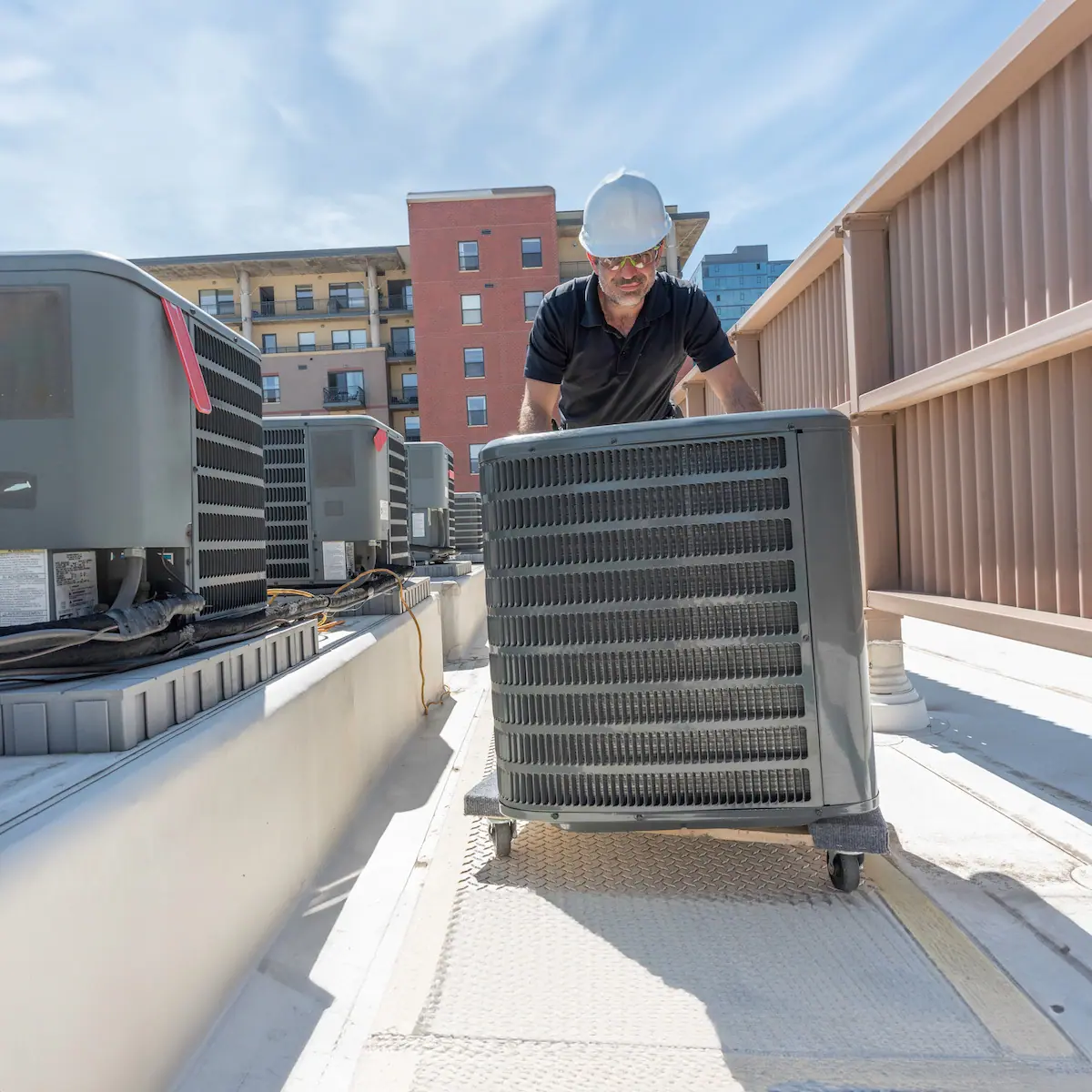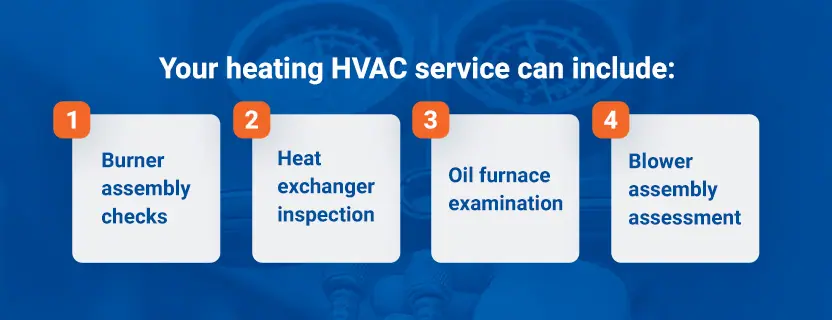The Relevance of HVAC Setup: Secret Considerations for a Comfortable Indoor Environment
The installation of a heating and cooling system is a critical component in accomplishing a comfortable and energy-efficient indoor environment. The process entails a number of nuanced factors to consider that go past merely picking a system off the shelf. Aspects such as the viability of the system for details structure needs, proper sizing to circumvent ineffectiveness, and the experience of specialists for a top quality installment play critical roles. In addition, the adoption of innovative innovations can dramatically improve system performance. Yet, recognizing these intricacies is merely the beginning of making sure optimum indoor comfort. What are the important components that determine successful heating and cooling implementation?
Choosing the Right System

When picking a cooling and heating system, it is vital to review the capacity required to effectively warm or cool down the area without straining the system, which can bring about boosted wear and functional costs. Consulting with an expert HVAC service provider can give important insights into selecting a system that aligns with both the expected usage and the architectural design patterns of the building.
In addition, thinking about the integration of smart modern technology can enhance system management and monitoring, using greater control and possible cost financial savings. By diligently assessing these factors, one can ensure the choice of a HVAC system that not only fulfills instant requirements but additionally adds to lasting operational sustainability and owner comfort.
Understanding Power Performance
Comprehending energy effectiveness is essential when considering a HVAC installment, as it directly affects both the ecological footprint and the functional expenses of the system. The efficiency of an A/c system is generally shown by rankings such as SEER (Seasonal Energy Effectiveness Proportion) for air conditioners or AFUE (Yearly Fuel Utilization Efficiency) for heaters.

Purchasing an energy-efficient heating and cooling system not just converts to set you back savings yet likewise adds positively to ecological conservation by reducing greenhouse gas discharges. In addition, several jurisdictions supply motivations or refunds for the installment of high-efficiency systems, additionally boosting their economic charm.
When examining energy performance, consider sophisticated features such as variable speed motors, smart thermostats, and zoning abilities. These innovations improve the system's capacity to adjust to differing demand, thereby optimizing energy usage. It is essential to talk to cooling and heating professionals that can provide insights right into the very best options customized to particular climate problems and usage patterns, making certain optimal efficiency and convenience.
Significance of Proper Sizing

On the other hand, an undersized cooling and heating system will certainly struggle to get to the wanted temperature level, particularly during extreme climate condition. This can cause continual operation, resulting in greater power costs and possible getting too hot of system parts. In addition, insufficient sizing can result in inconsistent temperature level distribution, triggering particular areas of a building to be as well amazing or too warm.
To achieve the proper sizing, a thorough load estimation is crucial. This includes assessing different elements such as the structure's square footage, insulation levels, home window kinds, and neighborhood environment conditions. By accurately figuring out the heating and cooling requirements of an area, heating and cooling specialists can recommend systems that ensure reliable operation, minimized energy intake, and enhanced indoor comfort.

Making Certain High Quality Installment
A seamless HVAC installation is the cornerstone of a system's long life and performance. This specialist need to have comprehensive knowledge of varied systems and be adept at examining the particular demands of the structure.
Correct installment goes past plain placement of tools. It entails specific calibration to guarantee ideal air flow, reliable power intake, and uniform temperature level distribution. This includes precise ductwork installment, making sure connections are safe and leak-free, which is crucial for preserving system efficiency and indoor air top quality.
Furthermore, the execution of sophisticated analysis devices throughout installation can detect prospective issues early, stopping costly repair work and prolonging the lifespan of the system. The professional needs to also make sure that all parts are compatible and that the system adheres to local building regulations and policies.
Routine Upkeep Practices
Once the structure for a high-performing heating and cooling system is established through top quality installation, the emphasis should shift to normal upkeep practices to make sure ongoing effectiveness and reliability. Regular maintenance not just expands the lifespan of the system yet likewise improves indoor air quality, reduces power consumption, and protects against pricey repairs. Important maintenance jobs include frequently transforming air filters, cleaning evaporator and condenser coils, and inspecting the system for leakages or clogs.
Air filters need to be changed or cleaned every one to three months, depending on use and ecological aspects. This basic task can considerably enhance air circulation and system effectiveness (Brownwood TX HVAC Contractor). Cleansing the evaporator and condenser coils prevents dust accumulation, which can prevent warmth absorption and cooling ability. Additionally, expert service technicians ought to evaluate the system yearly, looking for refrigerant degrees, electric links, and overall system performance.
Interest to Visit This Link ductwork is additionally crucial; securing and helpful hints cleaning up air ducts routinely avoids air loss and contamination. Executing a maintenance timetable ensures that small problems are dealt with before they escalate, guarding the system's functional stability. By adhering to these upkeep practices, homeowners can enhance their cooling and heating system's functionality and preserve a comfy indoor environment year-round.
Conclusion
cooling and heating installation plays a crucial duty in guaranteeing interior comfort and enhancing power performance. Heating Contractor in Brownwood TX. By selecting an appropriate system tailored to details structure demands, recognizing power performance, and making certain correct sizing, inadequacies can be reduced. The involvement of experienced professionals assurances top quality setup, while the assimilation of innovative innovations boosts system performance and tracking. Normal upkeep is vital for extending system life expectancy and improving indoor air quality, thus fostering a sustainable and comfortable living or workplace.
Several types of A/c systems are readily available, including split systems, crossbreed systems, duct-free systems, and packaged home heating and air systems, each with distinctive benefits and constraints.
Comprehending energy performance is necessary when thinking about a Cooling and heating setup, as it directly affects both the ecological impact and the operational expenses of the system. The efficiency of a HVAC system is generally suggested by ratings such as SEER (Seasonal Energy Efficiency Ratio) for air conditioners or AFUE (Annual Gas Utilization Efficiency) for heating systems (emergency ac service Brownwood TX).As soon as the structure for a high-performing Heating and cooling system is established through quality installation, the emphasis must change to normal maintenance techniques to make sure continued efficiency and dependability. Additionally, specialist specialists should inspect the system every year, checking for refrigerant degrees, great post to read electric connections, and total system performance